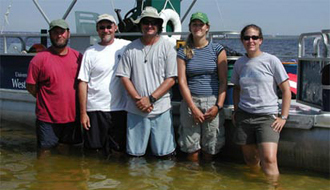Maritime Field School 2005

As part of the University of West Florida's 2005 summer field school, archaeologists and students conducted a multi-component investigation of Pensacola's underwater archaeological resources. The summer's research included the following: an examination and evaluation of the area's significant submerged archaeological sites to determine Hurricane Ivan's impact on these resources, remote sensing in areas of the bay suspected of containing the remains of historic wreck sites, diver investigations of targets resulting from remote sensing surveys and detailed recording of vessels exposed by Hurricane Ivan. Dr. John Bratten and Research Associate Greg Cook served as the principal investigators. Graduate students Wayne Abrahamson, Krista Jordan and Lisa Hopwood gained experience in field school management as the graduate supervisors.
Hurricane Evaluations
Hurricane Ivan was one of the most catastrophic events in Pensacola's history. Preliminary evaluations of two historic wreck sites (the Emanuel Point shipwreck and the Santa Rosa Island wreck) indicate significant differences in preservation post-Hurricane Ivan. While the Emanuel Point shipwreck remained largely intact after the storm, the Santa Rosa Island wreck underwent phases of exposure and reburial that affected the site's integrity. After evaluating the condition of the Santa Rosa Island wreck, field school students participated in the stabilization of the site by placing landscaping cloth on the exposed hull and securing it with ballast and sandbags.
Remote Sensing
Students participated in several phases of remote-sensing survey in different areas of Pensacola Bay including magnetometer surveys along the historic Pensacola waterfront, near the Emanuel Point shipwreck, to search for the presence of other Luna-era (1559) wrecks from the first colonization attempt in Florida; magnetometer surveys near the Santa Rosa Island wreck to search for the missing stern section that broke off during the wrecking of the vessel in 1705; magnetometer, side-scan sonar and swim-line surveys in Navy Cove, off of Deadman's Island, to search for both known and unknown wreck sites in this historic careening area and magnetometer surveys in the Blackwater River that runs into Pensacola Bay. For additional information, check out the Pensacola Waterfront Survey website.
Diver Investigations
Throughout the summer, UWF students conducted over six hundred dives on known wreck sites as well as magnetic and sonar anomalies encountered during the remote sensing phase of the field school. Students dived on the Emanuel Point wreck (1559), the Santa Rosa Island wreck (1705) and discovered a previously unknown historic wreck in the Blackwater River, two wreck sites in Navy Cove and a portion of hull, possibly dating to the Civil War, off of Deadman's Island.
Field school Summary
UWF field school students had a busy summer conducting intensive Phase I (survey) and Phase II (diver investigation/site testing) research in conditions ranging from the brackish Blackwater River to the beautiful blue water and sandy beaches of Navy Cove. Accomplishments this summer include the evaluation of several sites after Hurricane Ivan, the stabilization of an important shipwreck site off of Santa Rosa Island, the discovery of three previously unknown shipwrecks and a portion of a fourth and the completion of remote sensing surveys in several areas of Pensacola Bay.
Oh, and we had a lot of fun doing it!



